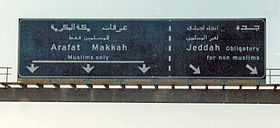宗教隔離
| 系列條目 |
| 反猶太主義 |
|---|
 |
|
|
宗教隔離是指人們根據自己的宗教進行隔離的一種社會現象,也指法律規定或隱含的隔離制度。[1][2][3][4]
穆斯林與非穆斯林的隔離
[編輯]伊斯蘭國家
[編輯]伊朗
[編輯]伊朗以伊斯蘭教為國教,由什葉派宗教學者等級領導神權政治。伊朗把非穆斯林的一神論者身分定為齊米(Dhimmi,「順民」)[5],美國國務院確認有「基於宗教信仰的監禁、騷擾、恐嚇和歧視」事件在伊朗發生[6]。
伊朗憲法中,巴哈伊教不屬於當局承認的少數宗教群體[7],在伊朗被認為是叛教者[8][9],因為該教相信較穆罕默德晚出生的先知巴哈歐拉,違背伊斯蘭教中關於穆罕默德是最後一位被派往人類的使者的教義[10]。有信奉巴哈伊教的學生因宗教被大學開除[11][12][13],而巴哈伊教教育工作者必須放棄宗教信仰以獲得伊朗的大學教席。[14]
沙特阿拉伯
[編輯]
2004年3月1日之前,沙烏地阿拉伯政府官方網站明文規定猶太人被禁止進入該國[16][17][18]。法律只容許穆斯林進入位於該國的聖城麥加和麥地那,非穆斯林不得進入或穿越麥加,試圖進入可能會受懲處如罰款[15],踏足麥加更可能會被驅逐出境。由於這個規定所限,在這些城市提供服務的外國公司必須僱用穆斯林員工或讓非穆斯林員工在城外工作[19]。
20世紀80年代,麥加和麥地那的電話服務由加拿大貝爾電話公司(Bell Canada)提供[20],該公司在城外設立非穆斯林員工的辦公室[21],而在1970年代後期因招聘涉及宗教和性別歧視而被告上加拿大人權仲裁庭(Canadian Human Rights Tribunal)[22]。
非伊斯蘭教國家
[編輯]其他
[編輯]英國
[編輯]倫敦的宗教隔離較種族隔離常見,其中有四分一居民自願選擇在宗教隔離的社區居住[23][24]。
波斯尼亞和黑塞哥維那
[編輯]《衛報》記者認為波斯尼亞和黑塞哥維那是「一個依賴、被扼殺和種族隔離的國度」,並形容聯合國駐波黑國際高級代表以「聯合國認可的自由帝國主義」控制波斯尼亞,造成「依賴、扼殺民間社會,當地因戰亂受傷和失業的居民受外國領薪人員管治,因而形成非常明顯的金融隔離制度」。[25]
參考文獻
[編輯]- ^ Knox, H. M. Religious Segregation in the Schools of Northern Ireland. British Journal of Educational Studies. 1973年10月. "...[S]egregated schooling, although in theory open to all, is in practice availed of by virtually only one denomination...." Also refers to pre-Partition religious schools which retained their exclusively Catholic demographics after Partition.
- ^ Norgren, Jill; Nanda, Serena. American Cultural Pluralism and Law. Greenwood Publishing Group. 2006: 132. ISBN 0275986926. , quoting U.S. Supreme Court Justice Anthony Kennedy in Board of Education of Kiryas Joel Village School District v. Grumet: "...[D]rawing school district lines along the religious lines of the village impermissibly involved the state in accomplishing the religious segregation."
- ^ Akkaro, Anta. Pakistan's Christians Demand End to 'Religious Apartheid' at Polls. Christianity Today. 2000-09-01 [2008-08-18]. (原始內容存檔於2008-09-15).
- ^ Religion In Schools. The Big Debate. 0:09:29 and 0:11:52 記錄於. 2008-01-29 [2011-02-27]. (原始內容存檔於2008-09-21)., in which Rabbi Dr Jonathan Romain says (at 0:09:29): "If you have separate Jewish, Catholic, Muslim, Sikh, Hindu schools, essentially you’re segregating children, you’re separating children" and (at 0:11:52): "It’s a religious apartheid society we’re creating."
- ^ International Federation for Human Rights. Discrimination against religious minorities in Iran (PDF). fdih.org. 2003-08-01 [2006-10-20]. (原始內容 (PDF)存檔於2006-10-31).
- ^ U.S. Department of State. International Religious Freedom Report 2006 - Iran. U.S. Department of State. 2005-09-15 [2006-11-08]. (原始內容存檔於2012-03-19).
- ^ Discrimination against religious minorities in IRAN (PDF). FIDH: 6. [2008-08-03]. (原始內容 (PDF)存檔於2006-10-31).
- ^ Iran: Religious minority reports arson attacks. Persian Journal. [2008-08-03]. (原始內容存檔於2013-06-10).
- ^ Islam and apostasy. The Religion Report. ABC Radio National (Australia). [2008-08-05]. (原始內容存檔於2011-10-12).
- ^ Bahá'í believers know freedom and oppression. Clarion Ledger. [2008-08-03]. [失效連結]
- ^ Baha’i children in Egypt not being admitted to schools because of their faith. Muslim Network for Bahá'í Rights. [2008-08-03]. (原始內容存檔於2019-03-01).
- ^ School's Out for the Bahá'ís. Mideast Youth. [2008-08-03]. (原始內容存檔於2018-12-21).
- ^ Confidential Iran memo exposes policy to deny Bahá'í students university education. Bahá'í World News Service. [2008-08-03]. (原始內容存檔於2012-03-19).
- ^ Segregation in Iran. Times Higher Education. TSL Education Ltd. [2008-08-03]. (原始內容存檔於2011-05-21).
- ^ 15.0 15.1 Sandra Mackey's account of her attempt to enter Mecca in Mackey, Sandra. The Saudis: Inside the Desert Kingdom. W. W. Norton & Company. 1987: 63–64. ISBN 0393324176.
- ^ "The official tourism website stated that Jews were banned from entering the country; however, it was not enforced in practice." United States Department of State. Saudi Arabia (頁面存檔備份,存於網際網路檔案館), Country Reports on Human Rights Practices - 2004, February 28, 2005.
- ^ Jews barred, said Saudi Web site. CNN. February 28, 2004 [2008-06-02]. (原始內容存檔於2016-03-03).
- ^ www.sauditourism.gov.sa, 2004-02-06 [2011-02-27], (原始內容存檔於2004-02-06)
- ^ Cuddihy, Kathy. An A To Z Of Places And Things Saudi. Stacey International. 2001: 148. ISBN 1900988402.
- ^ Orr, David. BCI One Year Extension Of Saudi Contract. Bell Canada Enterprises. 1987-11-12 [2011-02-27]. (原始內容存檔於2011-09-27).
- ^ Mackey, Sandra. The Saudis: Inside the Desert Kingdom. 1987: 63–64.
- ^ In the matter of the complaint of Canadian Human Rights Commission alleging discrimination in employment by Bell Canada. Canadian Human Rights Tribunal. 1981-01-30 [2011-02-27]. (原始內容存檔於2012-03-19).
- ^ London's neighbourhoods 'segregated by religion'. [2011-02-27]. (原始內容存檔於2015-04-02).
- ^ Britain 'sleepwalking to segregation'. [2011-02-27]. (原始內容存檔於2012-11-13).
- ^ Steele, Jonathan. Today's Bosnia: a dependent, stifled, apartheid regime (頁面存檔備份,存於網際網路檔案館). The Guardian, November 11, 2005.
